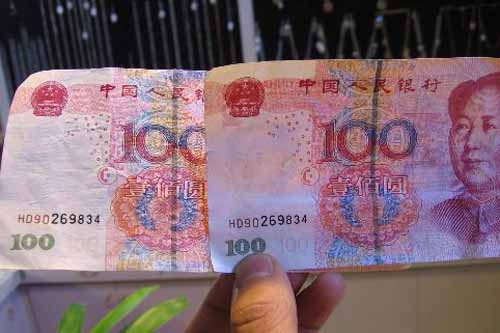Taiwan police recently cracked a counterfeiting ring suspected to have been active on both sides of the Straits. Local media reports say the printing presses have been operating for some time. Large batches of fake notes have made their way onto the mainland by sea, and some have already entered Hong Kong through the Pearl River Delta.

Following intelligence on the counterfeiting activities, the Taiwan Crime Investigation Bureau cooperated with the Gaoxiong local police department and launched a simultaneous operation in Daliao Village, Gaoxiong City, and Pindong County.
They arrested a 41-year-old suspect surnamed Xu and his five accomplices and seized fake RMB bills valued at 100 million yuan, 45 million yuan in semi-finished notes, 3,500 stacks of bus fare invoices (worth TW$16.8 million = approx. US$0.5 million), and other items of evidence like money detectors, a two-color printing press, paper cutters and aluminum templates. Gaoxiong's local procurator has started proceedings against the six suspects.
Several financial organizations in Taiwan report that on January 5 and January 12, fake HD90 bills were quickly identified by cashiers.
Local police in Taiwan say the case is still under investigation and they will step up efforts to combat currency counterfeiting. However, they did not confirm that fake notes starting with the serial numbers HD90 or HD90 had been produced by counterfeiting groups in Taiwan.
Forged notes in HK and Macau, police launch joint op
On January 13 Hong Kong police department pointed out that fake HD90 notes have also surfaced in Hong Kong and Macau lately, but emphasized in a way to reassure to the public that the HD90 forged bills were not as of high quality as the public had previous thought and were identifiable to the naked eye and by touch. They also emphasized that not all HD90 notes are necessarily fakes. A Guangdong police officer revealed that an effective cooperation process for combating the forged notes supply chain, established by the police departments of the province and the SAR governments, will be particularly active during the Spring Festival.
During a press conference on January 13, Hong Kong police said 10,314 fake RMB bills had been detected throughout 2008, a 15 percent increase compared with 8,992 detected in 2007. Among the fake cash, 100-yuan notes accounted for 83 percent, while 50-yuan notes took up 8 percent and 20-yuan, 5.4 percent. In addition, the majority of fake notes were handed to the police via banks.
As to the controversial HD90 fake notes, Chief Inspector Ruan Jinliang of the Business Crime Investigation Division of Hong Kong Police Force affirms: "There is no way they will pass through Hong Kong's cash detectors." But some detectors used in the mainland may be of lower quality, and may fail to identify the counterfeits.
Comments: Cross-Straits cooperation leaves no place for fake notes to hide
Cross-border organized crime is on the increase thanks to the full launch of the "Three Links" across the Straits, Xinhua News Agency commented yesterday. It said the joint effort involved in combating the fake HD90 bills reflects a need for both sides to step up cooperation in financial surveillance over currency circulation. Such mutual cooperation and trust is expected to develop, so that the mainland's markets and Taiwan's capital can work together safely and freely, producing tangible fruits that people on both sides of the Straits can enjoy.
(China.org.cn by Maverick Chen, January 15, 2009)